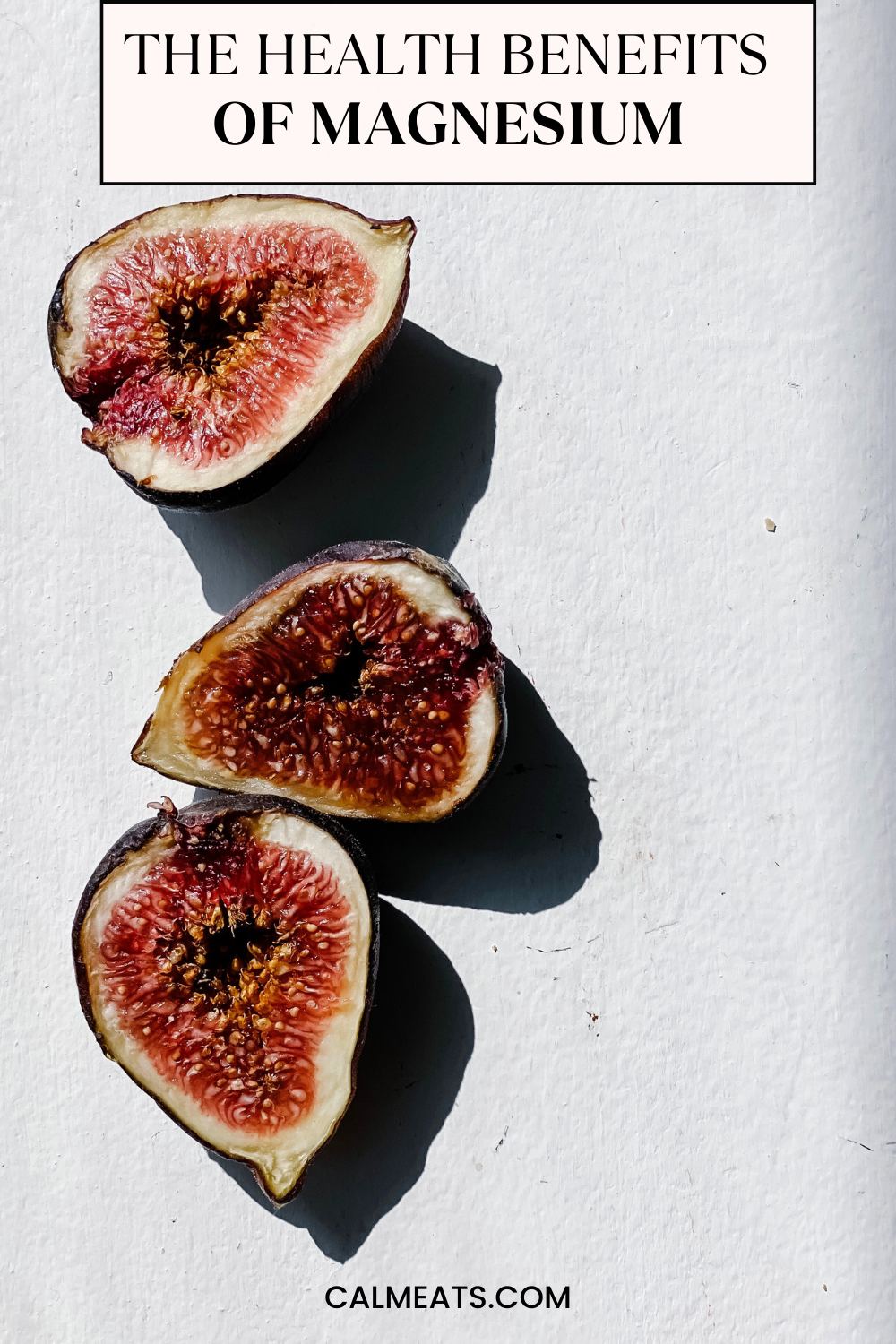In this post, you'll learn all about the health benefits of magnesium, the best magnesium food sources, and all the different types of magnesium supplements.

When it comes to the holy grail of nutrients, magnesium may be a leading contestant. Magnesium is the one of the most abundant minerals in the human body. It is estimated that something like 60% of adults in the US are deficient in this mineral.
Considering that magnesium plays a vital role in almost every function of our body, I would think it's one we need to pay particular attention to. Magnesium in the body is found in bone, muscle as well as the blood. It is involved in over 300 biochemical reactions in the body and affects everything from digestion to heartbeat, muscle function, mood and more.

Sings of magnesium deficiency
- Anxiety and depression
- Muscle cramps
- High blood pressure
- Hormone imbalance
- Irregular heartbeat
- Sleep disturbance
- Digestive issues
- Fatigue
- Low bone density
- Migraine
Benefits of magnesium
- Gut health: Magnesium plays a vital role in regulating enzyme production and regulating transit time and motility. Additionally magnesium deficiency alters gut microbiota which leads to depressive behavior, therefore increasing magnesium can directly affect the gut-brain-axis.
- Depression support: Magnesium plays an important role in mood stabilization. "Numerous pre-clinical and clinical studies confirmed the initial observations as well as demonstrated the beneficial safety profile of magnesium supplementation. Thus, magnesium preparations seem to be a valuable addition to the pharmacological armamentarium for management of depression."
- Lowers blood pressure: One study shows that supplementing with 450 mg of magnesium chloride over a 4 month period, reduced systolic and diastolic blood pressure.
- Reduces PMS symptoms: You may have heard that supplementing with magnesium, particularly a week before your period, may reduce PMS symptoms. Supplementing with as little as 200 mg, is shown to reduce PMS symptoms.
- Decreased anxiety: Magnesium alleviates stress induced anxiety by binding to GABA receptors. "When GABA is low, your brain gets stuck in the “on” position and it becomes impossible to relax." It also has a calming effect on the nervous system which helps the mind and body relax.
- Lower risk of type 2 diabetes: A meta-analasys involving 13 studies finds that higher intake of magnesium significantly lowers the risk of developing Type 2 Diabetes.
- Reduced depression: Numerous studies report that magnesium supplementation may significantly reduce depression symptoms. Pre-clinical and clinical studies support that "magnesium preparations seem to be a valuable addition to the pharmacological armamentarium for management of depression."
While Magnesium plays a role in may other factors in the body, those are just some of the important ones. In order to properly increase magnesium we have to focus on magnesium rich foods and/or proper supplementation.
Magnesium-rich foods
- Leafy greens: Spinach, kale, collard greens, mustard greens and turnip greens provide a substantial amount of magnesium. One cup of cooked spinach provides nearly 40% DV of magnesium intake or 157mg.
- Pumpkin seeds: An easy way to increase magnesium is by snacking on pumpkin seeds or adding them to salads, soups, baked goods, etc. ⅛th of a cup provides 23% DV of magnesium or 92 mg.
- Almonds: A perfect snack that can provide 20% DV of magnesium or about 80 mg. Almonds are versatile and easy to sneak in your day.
- Black beans: Now, if you're strict paleo, this may not be an option for you but if you're not, ½ cup of black beans can provide 15% DV of magnesium or about 60 mg.
- Avocado: I've written extensively about my love for this magical fruit. There are numerous ways of eating avocado and if you're an avid food lover, chances are you already eat plenty of it. One medium avocado provides 15% DV of magnesium or about 58 mg.
- Dark chocolate: Everyone rejoices as chocolate is good for you. Real dark chocolate contains 70% or more cacao. One square provides 24% DV of magnesium or 95 mg.
Other foods that are good to add to your magnesium sources include kefir or yogurt, figs, bananas, salmon, artichokes and cashews.
While getting all your required magnesium from food is a wonderful idea, this is not always feasible. I'm the first one to admit that I try my best to consume most of these foods regular but I do supplement. When it comes to supplementation of magnesium, timing is important. Particularly if you're using it to help with sleep. I generally take my magnesium supplement right before bed. It's something I do every night without fail and it has dramatically improved the quality of my sleep (when the kids don't wake me, of course).
Magnesium supplements
- Magnesium glycinate: This is one of the more absorbent types of magnesium so when you're shopping for supplements, be sure to do your reattach as all supplements are not created equal.
- Magnesium citrate: Often helps to draw out water from your body and move it towards the intestines and is therefore used in the treatment of constipation and help with evacuation.
- Magnesium oxide: Typically used in the treatment of stomach acid or sour stomach.
- Magnesium l-threonate: This form of magnesium crosses the blood-brain barrier and is recommended to improve cognition, concentration, and relaxation, and may be helpful for brain-related disorders.
- Magnesium malate: Has been used in the treatment of depression, diabetes and cardiovascular disease.
- Topical magnesium: This often comes in spray or lotion form and is easily absorbed directly into the skin.
- Epsom salt (Magnesium sulfate): A fantastic way to get your body to absorb magnesium while decompressing in a warm tub, is to add magnesium rich epsom salt.
As you see, increasing magnesium levels doesn't require a ton of work. The proper nutrition, good supplementation can easily restore your levels and improve the overall quality of your life.







Comments
No Comments